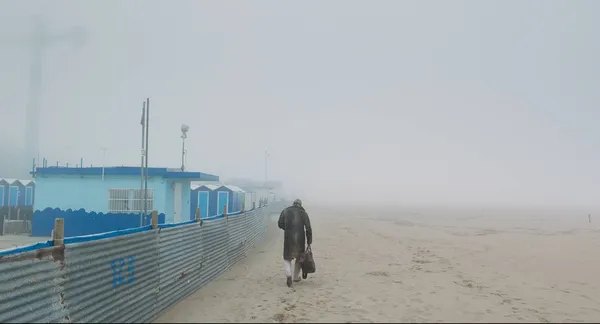 |
| Ulrich Seidl on Rimini: “I had images in my head of fog, of empty beaches, closed bars and restaurants, and hotels. All of this wrapped in a beautiful wintry sentimentality and loneliness.” |
About a day as beautiful as today that should never fade away sings a row of inhabitants in an Austrian nursing home, holding on to their walkers for dear life. So begins Ulrich Seidl’s heartbreaking Rimini (72nd Berlin International Film Festival), co-written with Veronika Franz (The Lodge and Goodnight Mommy with Severin Fiala), shot by Wolfgang Thaler (Maria Schrader’s Stefan Zweig: Farewell to Europe), with costumes by Tanja Hausner (Frauke Finsterwalder’s Sisi & I, starring Susanne Wolff and Sandra Hüller). Rimini is as close to a musical as the director will probably ever get, conjuring up an eternal return of suffering, memories, and curated forgetting.
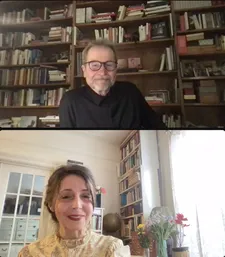 |
| Ulrich Seidl with Anne-Katrin Titze on costume designer Tanja Hausner: “We first look into the closets of the performer.” |
Seidl exposes in the first scene the kind of shameless sentimental play with nostalgia and flattening of experience that happens in institutions for seniors all over the world, precisely by being so very specific. Ekkehart (the fantastic Hans-Michael Rehberg in his final film role) is not the centre of this fable, though maybe its motor. One of his two sons, known by his stage name Richie Bravo (Michael Thomas), is unquestionably the star, albeit fading in his fame. His brother Ewald (Georg Friedrich, who plays Archduke Ludwig Viktor of Austria in Sisi & I) is the protagonist of Seidl’s Sparta, which had its world premiere at the 70th San Sebastián International Film Festival and is Rimini’s companion piece. A long version, combining both films just premiered in Rotterdam.
Richie, who only seems to visit Austria in emergencies, lives year round in his idiosyncratic “villa” on the Italian Adriatic coast. The seaside town, birthplace of Federico Fellini, has been since the 19th century a popular tourist destination, which especially after the Second World War attracted many German speaking visitors during the summer. It is winter now and Richie, a singer of once marketable pop songs, performs his repertoire for sparse groups of fans, mainly females of a certain age.
The empty windswept beaches and the fog from the sea cloud the goings-on in a melancholic longing, alluring and cold in Rimini. Levan Koguashvili’s multiple award-winning Brighton 4th (a highlight in the 20th anniversary edition of the Tribeca Film Festival), shot beautifully by Phedon Papamichael, about Georgian emigrants living in Brooklyn’s Brighton Beach neighbourhood, may come to mind, in the way the sea and the grey skies clash with what mankind decided to construct.
Dressed in furs and cowboy boots, tight denim and wife beaters, shiny berry-coloured jackets or golden overalls, the former provincial headliner starts his days with a first of many drinks, gambles at slot machines (wisely called Terrybell), and tries to survive any way he can. You almost expect him to sing Just a Gigolo, but that would transport him back too far into the times of his father, whose past is merely hinted at by the Nazi song he likes to chant while getting lost in the nursing home; the sentence inscribed at the gate of Buchenwald (“Jedem das Seine” - “To each his own”) being another one of the father’s favourite quotes.
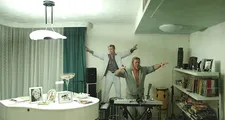 |
| Richie Bravo (Michael Thomas) in rehearsal |
A third generation enters the picture when Richie’s daughter, Tessa (Tessa Göttlicher), suddenly appears at one of the rundown hotels Richie performs at, asking for recompense after 18 years of neglect and lack of contact.
From Vienna, Ulrich Seidl joined me on Zoom for an in-depth conversation on Rimini.
Anne-Katrin Titze: Good evening! You are in Vienna?
Ulrich Seidl: Yes!
AKT: We met once before briefly in person during your retrospective at BAM many years ago.
US: Very long ago!
AKT: I want to start out with Hans-Michael Rehberg and his incredible performance in Rimini. I remember seeing him in the theatre even longer ago, when I was still in school and he played the title role of Ibsen’s John Gabriel Borkman, directed by Ingmar Bergman. This is his last role (and the film is dedicated to him). Can you tell me about casting him?
US: For me it was very difficult to find someone for this role. It had to be a man over 90 and he had to perform dementia, which I think is one of the most difficult things for actors. The question was not whether he could portray a Nazi, but a person with dementia. During the casting I saw a number of older gentlemen, most of them stage actors, and I was at the very start not convinced necessarily that Hans-Michael Rehberg would be the right one. He was already very ill at that time.
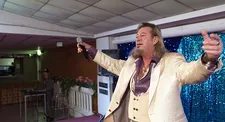 |
| Richie Bravo (Michael Thomas) accepting the adoration |
I met him and he was skeptical if he even wanted to do it. But then he contacted me with his wife, because she thought he should definitely do it. So I cast him, under the condition that before we started shooting he had to drive repeatedly to this nursing home and live in that room, eat with them, go to their events so that he could internalise it. He did that very well, but I was concerned because he was already very weak. But strangely enough, he was a changed man the first day of shooting. He was such a professional and during the ten days of shooting we were all deeply impressed by his accomplishment.
AKT: He is at the top, as far as the portrayal of dementia is concerned, right up there with Anthony Hopkins in Florian Zeller’s The Father and Pascal Greggory in Mia Hansen-Løve’s One Fine Morning. The ending of your film, with Rehberg listening to Franz Schubert’s Winterreise, it is terribly touching to see him crying like this. And what it does to us is frightening in that it makes us almost want to pardon him for singing “Today Germany belongs to us and tomorrow the whole world” earlier on.
US: For me in Rimini, the mother, who doesn’t appear, does show up in the men. At the start the funeral, and the end bracket where Hans-Michael Rehberg calls out for his mother.
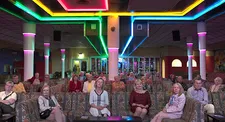 |
| Richie Bravo audience |
AKT: Yes, the mother who lives in the pickled fruit jars and sings in the Winterreise. There is also a mother next door with one of the women in Rimini who finance Richie Bravo. Ghostly mothers are floating over Rimini. The place itself in your film is less the birthplace of Fellini, than the promise it used to carry, especially for German-speaking tourists after the Second World War. A kind of dream Italy that promised a new future. Thus again the father also hovers over the location in which you found tremendous images. Was Rimini always the place?
US: No, it wasn’t clear. In my imagination it was supposed to be a spot at the Adriatic Sea, but it could have been elsewhere. I had images in my head of fog, of empty beaches, closed bars and restaurants, and hotels. All of this wrapped in a beautiful wintry sentimentality and loneliness. I travelled to Rimini because, exactly as you said, I as a child with my parents, had been there for a beach vacation. So I gave it a look and found so many inspiring locations that I quickly decided to go for it.
AKT: Very important are Tanja Hausner’s costumes in regards to how we encounter Richie Bravo. In fur coat, and cowboy boots, and white wife beater tops and tight jeans and shiny berry-coloured jackets. Tell me a bit how you worked with her and Michael Thomas on the look!
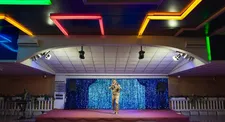 |
| Richie Bravo (Michael Thomas) performing |
US: For me thoughts about costumes, also together with Tanja Hausner, start with an actor or even an extra’s closet. We first look into the closets of the performer.
AKT: I see!
US: And Michael Thomas has a weakness for, how shall I put it, cowboy mentality. He performed for a long time in the Winnetou festivals (celebrating German author Karl May’s Western fantasy writings). He did it for 15 years, I think.
AKT: You have him sing a Winnetou song. Is that a real song or one invented for the film?
US: No, that exists. That was the music in the Sixties and Seventies for the Winnetou movies. Michael Thomas often sang it in the context of these festivals. The costumes are a combination of Tanja’s ideas and perhaps Michael’s suggestion, and my imagination.
Some things happen by chance. This fur coat, this sealskin coat, Michael Thomas found at a flea market in Vienna. And one day he showed up in it and we all loved it. All the costumes he performs in on stage were made by Tanja. The concept is that they no longer fit him, that everything is too tight, that his belly sticks out - that’s the case with all the glittery things.
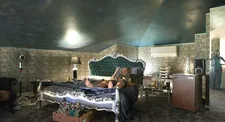 |
| Richie Bravo (Michael Thomas) at Villa Bravo |
AKT: Some of the great strengths of your films are these moments of unexpected recognition for audiences. For instance, anyone who ever visited a beloved person in a nursing home knows the experience of shock when for a moment you can no longer recognise the beloved person in the crowd, because everybody looks the same. It’s the horror of recognising the loss of individuality. Another point for me was the tricycle race by the two brothers. My question is more general - do you purposefully place moments of possible recognition within your films or do they naturally occur?
US: They occur, it isn’t conscious. For the tricycles, the idea was that these two sons after a long time return to their parents’ house and their childhood is in the basement. They have to find together in a way. And the nursing home, it is a bit grotesque but it is really how it is. With my images I arrange and stage but at the core this is exactly what exists. The caretaker would for example sing with them this exact song. I draw from reality and create a tableau from it.
AKT: You don’t shy away from hopelessness, do you?
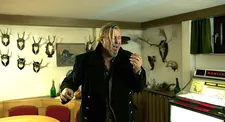 |
| Richie Bravo (Michael Thomas) singing in his father's basement |
US: No, I make films to point out things and make them conscious. We are not exempt, so it is to hold up a mirror to all of us. In these homes, where dementia patients live, they don’t have any human encouragement. It’s all routine. They are cared for, washed, given medications, eat. The other thing is one doesn’t want to look there. I experienced it myself going in there.
With Import Export I filmed for a long time in geriatrics and one wants to leave again because it’s almost impossible to bear. With time it gets better and you get to know the people. I find it very important because it is a societal taboo. People who aren’t in it don’t even want to know what it looks like inside. There’s enough money, but there’s no one who cares for what is happening inside their souls.
AKT: It’s an international phenomenon, the pushing aside and storing of the older generation. How it could ever become so normalised and ignored …
US: With the decline of extended families and the individualisation of society with everyone for themselves. The three-generation family with everyone living together no longer exists.
 |
| Richie Bravo (Michael Thomas) walks past refugees in the snow |
AKT: I had to think, looking at my notes on your film, about the Grimms’ fairy tale of The Boy Who Went Forth To Learn What Fear Was [which begins with a father and his two unequal sons].
US: Richie Bravo is not a young man anymore.
AKT: Definitely not, but all three of the men here have some not-grown-up-yet quality to them.
US: Maybe he was that once upon a time, going to Rimini. In the meantime years have gone by and he is no longer that star in the sky. He has to see how he can look at himself in the mirror.
AKT: And how to survive.
US: Yes, to survive. His failure. The films speaks a lot about failing.
AKT: Without giving too much away, at the end the villa where he lives in all this chaos feels warmer than ever before.
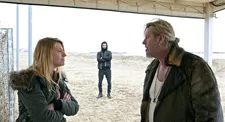 |
| Tessa (Tessa Göttlicher) confronts her father Richie Bravo (Michael Thomas) |
US: That’s also an interesting thought. It’s abstract. This didn’t happen. I thought about it in the sense of the action. What will happen with the daughter? How will this end between daughter and father? It was clear that he would never be able to pay. So the daughter gets the upper hand, so to say, and has the father in the palm of her hand.
And how successively the friends and family and cousins of her boyfriend are moving in is also a reality. I found it beautiful - it can be interpreted in many ways, but I find it a possible reality and Richie Bravo at the end of the film surrenders himself to it. He handed over his power and authority.
AKT: At first it seems like something out of Pinter or Buñuel. Another metamorphosis. Often the emotional entryways are in the details. The pillows with Richie Bravo’s face for instance. Even the Whitney museum has in the meantime surrendered to kitsch and is selling Hawaiian-style shirts with Edward Hopper prints on it, which wouldn’t look out of place worn by Richie Bravo. I’m not sure where I am going with this.
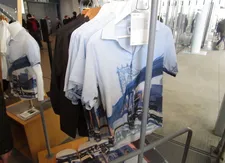 |
| Edward Hopper image on shirt at the Whitney Museum of American Art gift shop Photo: Anne-Katrin Titze |
US: I think there’s a difference. The fans of Richie Bravo love the kitsch. There are many people who don’t take his kind of popular “Schlager” music seriously. I take it very seriously. It would have been a big mistake to let Richie Bravo sing in the film without him really meaning what he sings. He makes people happy or brings them to tears, he produces emotions. That was really important to me for this character, and his counterfeit on the pillow belongs to this world. It has to be, because he has to market himself.
With the example you just gave something else is happening. Edward Hopper’s paintings are art. Through this reproduction it becomes levelled off, devalued. For me it becomes devalued. Van Gogh is another such example. Having it on a T-shirt is a complete devaluation. When I see the original I don’t even want to look at it anymore. That also happens with music. When advertising uses classical music it devalues it.
AKT: I have a question about the songs your protagonist sings - you combined existing songs, Udo Jürgens for instance, with new compositions?
US: Yes. The majority are composed and newly written songs, produced especially for the film. There are two exceptions, two songs by Udo Jürgens. We had a pool of songs, there’s also a CD and a record to go with the film with ten songs.
AKT: A word from you about Rimini’s sister film Sparta?
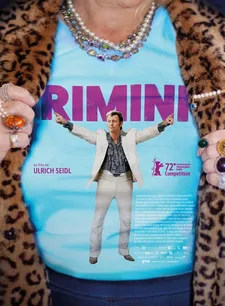 |
| Rimini Richie Bravo shirt poster |
US: The genesis of the original film project was the story of two brothers and a father. One of them Richie Bravo, the other Ewald in Romania. I noticed in the edit after a long time - the film was edited - that there were a number of problems I couldn’t solve. Then we experimented with making it two films. In the meantime there also exists the long version, the combined one, which just premiered in Rotterdam. So there exist the three films now.
When you watch the Richie Bravo film, audiences can concentrate on and get emotionally close to this person. And when in Sparta the two brothers are with the father it is more of a family film, which is also a very long film, and an even greater challenge. Many people love the film.
AKT: I recently had an email exchange with Ed Lachman who sends his warmest greetings to you! Thank you so much for this conversation.
US: Thank you! And when you speak with him next, please send my greetings to Ed!
Rimini opens at the Quad Cinema in New York on Friday, March 17.





















